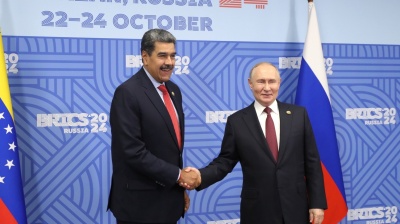Bulgaria’s fifth general election in two years ended with the winner as yet unclear, as exit polls indicate there is less than one percentage point between the two main rivals – Change Continues-Democratic Bulgaria (CC-DB) and Gerb-SDS.
Although initially most polling agencies said that CC-DB was in the lead, a parallel vote count later in the evening showed that Gerb-SDS appears to have a fragile victory. Neither party is anywhere near securing a majority in parliament.
According to Alpha Research, CC-DB initially had a slim advantage with 26.4% of the vote versus 25.5% for Gerb-SDS. Subsequently, that result changed in favour of Gerb-SDS (25.9%) and CC-DB came second (24.8%).
Gallup International also initially placed CC-DB first with 25.6% versus 24.8% for Gerb-SDS, but later during the evening of April 2 it said that parallel vote counting showed Gerb-SDS is leading with 25.9% versus 24.8% for CC-DB. Market Links claims that Gerb-SDS came first with 25.7% versus 25.2% for CC-DB.
Exit polls also showed that the battle for the third place between the ethnic-Turk Movement for Rights and Freedoms (DPS) and far-right pro-Russian Vazrazhdane is unclear too. Alpha Research's latest figures put the DPS on 14.1% versus 14% for Vazrazhdane.
The Bulgarian Socialist Party (BSP) came fifth with between 9% and 10%. There Are Such People (ITN) might also make it into the next parliament.
All polling agencies said there will be clearer results later during the night or early on April 3, as this time Bulgarians were able to pick between paper and machine ballots that would be counted manually.
Most of the political leaders did not comment on the exit polls as they want to see who the winner is first.
The turnout was low, at 39.3%, according to Alpha Research, which is similar to that in the previous snap general election held on October 2.
Political analysts are divided in their expectations on what will be the next steps of political parties. According to Georgi Stoychev, head of the Open Society NGO, the key to a regular government is the leader of Gerb, Boyko Borissov. If he decides to step down or to make compromises, the two main rivals, which claim to have the same pro-Western priorities, could form a government.
However, CC-DB are not united in their support for such an idea, with CC being more reluctant to make a compromise and unite with Gerb as the party and its leader have been involved in several major corruption scandals over the past several years.
Voters who backed CC-DB are also divided, with nearly half of them saying that the coalition should make a compromise and join forces with Gerb-SDS to form a regular government. 37% are against, while 14% cannot decide, according to Alpha Research.
"The results of this election confirm again what we know for long time — our society is deeply divided and this is a serious problem. However, except a problem, this is also an opportunity to start patching the torn fabric of this society. Democracy is a conversation between dissenters. The vote of citizens tells us once again that we must learn to hold this conversation," Hristo Ivanov, co-leader of DB, wrote on Facebook.
Another option is the so-called “paper coalition” comprising Gerb-SDS, the DPS and the BSP to formally unite in this parliament. The three formations acted jointly in the previous parliament to return from electronic voting back to paper ballots, which are seen as a tool for large-scale electoral fraud.
However, Stoychev said that such a coalition would be highly undesirable for its members, as it would cost the three formations significant electoral support in the autumn when the country will hold local elections.
Meanwhile, caretaker Interior Minister Ivan Demerdzhiev said there have been hundreds of reports of voters being bribed. Most of them were reports that voters had been paid to back Gerb and the DPS. In previous elections, the Anti-Corruption Fund NGO revealed that the two parties used dealers who secured them a certain number of voters.
News

APEC meeting closes in South Korea, WTO dead and buried
This was not a summit. It was a eulogy for the WTO, and APEC just lowered the flag to half-mast.

Turkish state grabs another fintech as company seizures continue at pace
Turkey first seizes companies, then tries the suspects. Some companies are sold before the trial process.

Ukraine’s elite HUR forces turn the tide in the battle for Pokrovsk, as Russia’s effort to capture key logistics hub fails
The battle for Pokrovsk became intense early on November 1and it looked like the fall of the key logistics hub to Russia was imminent. But a bold counterattack by Ukraine’s elite HUR forces seems to have turned the tide.

US prepares attack on Venezuela as Maduro begs Putin for aid
The Trump administration has reportedly drawn up a list of potential military targets within Venezuela as part of its intensifying pressure on President Nicolás Maduro, who has turned to Moscow seeking urgent military assistance.



